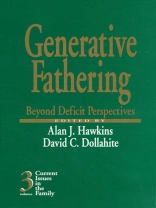Much of contemporary scholarship on fathers comes from a deficit model, focusing on men′s inadequacies as parents. This edited volume assembles a group of prominent scholars who go beyond a deficit model of fatherhood to what the editors call a generative fathering perspective. The generative fathering approach, inspired by the developmental theories of Erik Erikson and building on the pioneering research of John Snary, sees the work fathers do for their children in terms of caring for and contributing to the life of the next generation. The editors describe generative fathering, placing it in contrast to the role-inadequacy perspective of fatherhood. Contributors then elaborate on generative fathering in terms of gender, ethnicity, and historical perspectives and present research that helps us understand generative fathering in challenging life circumstances, such as special-needs children, teenage fathering, and divorce and remarriage. Applications for the generative fathering perspective are presented in terms of family life education, clinical work, and scholarly discourse. The editors conclude the volume with a chapter on ways to teach about generative fathering in college courses. Supported by both qualitative and quantitative research, this book goes beyond the frequent identification of fathers as primarily absent, abusive, deadbeat, deficient, or unnecessary, and helps us to understand fathers as men working to build caring bridges across generations.
Table of Content
Foreword – John Snarey
The Next Generation of Work on Fathering
PART ONE: BUILDING A PERSPECTIVE OF GENERATIVE FATHERING
Beyond the Role-Inadequacy Perspective of Fathering – Alan J Hawkins and David C Dollahite
Fatherwork – David C Dollahite, Alan J Hawkins and Sean E Brotherson
A Conceptual Ethic of Fathering as Generative Work
An Institutional Perspective on Generative Fathering – Kathleen Gerson
Creating Social Supports for Parenting Equality
An African Amercian Perspective on Generative Fathering – William D Allen and Michael Connor
Generative Fathering – Robert L Griswold
An Historical Perspective
PART TWO: EXPLORING GENERATIVE FATHERING IN CHALLENGING CIRCUMSTANCES
Generative Ingenuity in Fatherwork with Young Children with Special Needs – Sean E Brotherson and David C Dollahite
Teen Dads – J Lyn Rhoden and Bryan E Robinson
A Generative Fathering Perspective versus the Deficit Myth
Generative Fathering after Divorce and Remarriage – Kay Pasley and Carmelle Minton
Beyond the `Disappearing Dad′
Single Custodial Fathers and Their Children – Alfred De Maris and Geoffrey L Greif
When Things Go Well
Men and Women Cocreating Father Involvement in a Nongenerative Culture – Anna Dienhart and Kerry Daly
PART THREE: ENCOURAGING THE APPLICATION OF GENERATIVE FATHERING IN PRACTICE AND SCHOLARSHIP
Promoting Generative Fathering through Parent and Family Education – Glen F Palm
A Generative Narrative Approach to Clinical Work with Fathers – Anna Dienhart and David C Dollahite
Reconstructing `Involvement′ – Rob Palkovitz
Expanding Conceptualizations of Men′s Caring in Contemporary Families
The Best of Times and the Worst of Times – William J Doherty
Fathering as a Contested Arena of Academic Discourse
Questions and Activities for Teaching about Generative Fathering in University Courses – David C Dollahite, Stephanie N Morris and Alan J Hawkins












